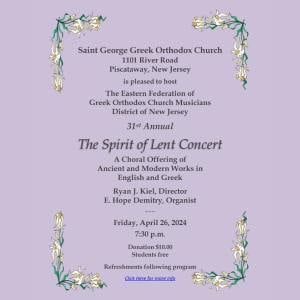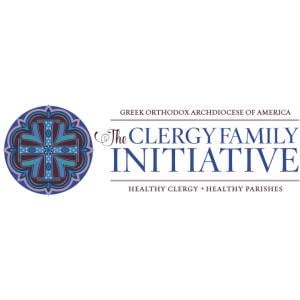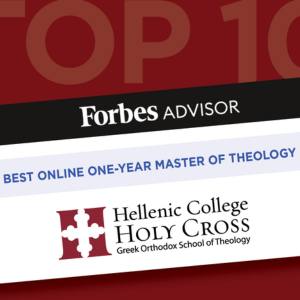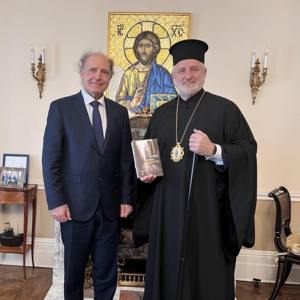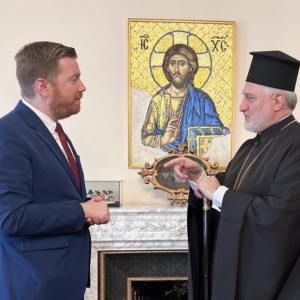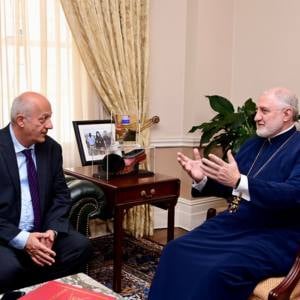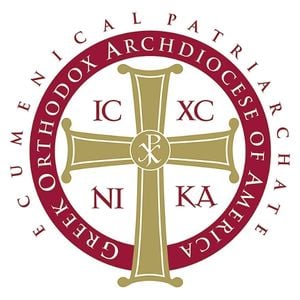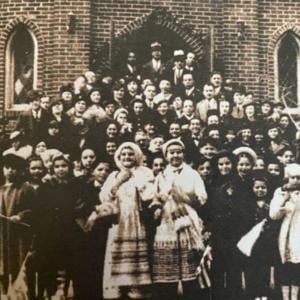Archbishop Elpidophoros of America Homily at the Divine Liturgy on the Sunday before the Nativity
December 20, 2020
Saint Barbara Greek Orthodox Church - New York, New York
Beloved Faithful of Saint Barbara,
I am delighted to finally be with you for the Divine Service, and especially on this Sunday before Christmas. This is a most special day, when we read the genealogies of our Lord Jesus Christ.
Earlier in the Matins service, we read the genealogy of our Lord as found in the Gospel of Saint Luke, which contains one line of the descendants of the Lord. The other genealogy, read in the Divine Liturgy, is from the Gospel of Saint Matthew. The Fathers of the Church teach that the difference between these genealogies is a matter of subtle points of Judaic Law, but there is another difference that may be more important.
If you look throughout the histories of the Jewish People in the Old Testament, you will see that women are never mentioned in the genealogies of the famous kings. But in the Gospel of Matthew, we hear the names of three women, and one more by inference. It is not unusual for one’s attention to wane as the clergy read the names in quick succession – the ἐγέννησε, ἐγέννησε, ἐγέννησε. But there is a very special reason for these names.
The names of these particular women are well known to anyone who knows the Old Testament: Tamar, Rahab, Ruth and the wife of Uriah, whose name was Bathsheba. It would take too long to recount all their stories here, but it is the nature of their motherhood that is the interest of the Evangelist.
Tamar had conceived her twin sons by her dead husband’s father – her former father-in-law – in a strange twist on the Jewish Law of a Levirate marriage. Rahab was a Canaanite harlot who saved the spies of Israel and was the mother of Boaz. Ruth was a foreign widow who married Boaz and gave birth to Obed, the grandfather of King David. And it was King David who committed adultery with Bathsheba, the last woman listed, and who was not named because of the broken commandment. But it was her son, the great Solomon who built the Temple, through whom the line of the Messiah derives.
Therefore, my beloved Christians, each of these women – whose presence in a genealogy is unique in Scripture – is a woman with questions about her status, legitimacy, nationality, and even morality. But there is a very specific reason for the mention of their names.
They are included to prepare the reader for what is coming. Each of their motherhoods was confusing at best, and scandalous at worst, especially for the early Jewish Christians. But this was all preparation.
The genealogy of Matthew is really saying something like this:
Don’t be confused or even scandalized that the Messiah – the Christ – has such women in his family tree. Sometimes, God uses strange relationships to accomplish His will. And if you think that these relationships are strange, wait until you hear who the actual Mother of the Messiah is – a Virgin!
All of this genealogy leads to one person – the Theotokos and Ever-Virgin Mary!
All the more unusual for a Jewish genealogy that is supposed to only have male ancestors. But the inclusion of the women point to the Theotokos and her unique role of bringing God into the world, of giving birth to Emmanuel, the Name that means “God with us.”
The birth-giving of the Mother of God was indeed miraculous, as we shall see on Christmas morning. As the Synaxarion of that day says:
Θεὸς τὸ τεχθέν, ἡ δὲ Μήτηρ Παρθένος. Τὶ μεῖζον ἄλλο καινὸν εἶδεν ἡ κτίσις;
God is born, His Mother is a Virgin! Has Creation seen something else greater or strange?
The answer is a resounding “No.” Creation had never seen a Virgin Birth, but the ancestors of the Lord had been in some strange relationships, and somehow, these prepared the early Christians to accept the miracle.
May we also accept the miracle of the Lord’s Holy Nativity with faith, and receive the Lord Born in Bethlehem of Judea, and may He grant unto us a blessed Feast of Christmas, and a safe, prosperous, and healthy New Year. Amen.



